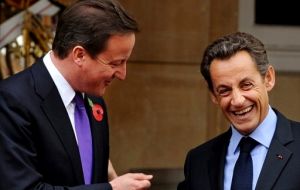MercoPress. South Atlantic News Agency
The “entente fugale” and the French point of view on defence of the Falklands
 James Arbuthnot, head of the British Parliament’s Defence Select Committee
James Arbuthnot, head of the British Parliament’s Defence Select Committee Dubbed the “entente frugale” and criticised by some as a dangerous dilution of military sovereignty, Franco-British defence cooperation is nonetheless growing stronger. Shrinking budgets, a less indulgent United States and Europe’s diminishing military clout in the world have bolstered the two countries’ determination to work together.
That contrasts with the prickly relations between French and British politicians, who have come to blows in recent months on everything from taxes to the European Union budget.
“While the politicians may trade barbs, defence knows there’s nowhere else to go other than working closely together,” said James Arbuthnot, head of the British Parliament’s Defence Select Committee.
“At the defence level the cooperation and friendships are more than cordial, they are warm,” he said, joking that he had forgiven France for killing an ancestor at Trafalgar. But there have been hiccups in the complex business of bringing Europe’s two biggest militaries together.
Britain has in recent weeks helped France with logistics in Mali, where French forces are battling Islamist rebels. “There’s no question how strong our military ties are. There is no questioning the need for strong defence cooperation; everyone’s convinced of that on both sides of the channel”, says a French military.
But there are more serious problems in cooperation on equipment projects, and some question how much each country is prepared to depend on the other to defend vital national interests.
However Arbuthnot admits there could be differences on issues such as the Falklands: since “doing more with allies, means that you have to decide to get rid of capability because you will be relying on your ally to provide that capability in times of need”.
The French see things differently and Falklands are not a good example, because “the real question is whether a country could afford full military capability alone”.
Since the Lancaster House defence cooperation treaties of 2010, Britain and France have joined forces to counter Islamists in Mali and helped topple Libya’s Muammar Gaddafi.
Last month pilots from each country flew the other’s new fighter jets for the first time, following a major joint naval exercise in October dubbed “Corsican Lion”, part of efforts to create a Combined Joint Expeditionary Force by 2016.
And in an unusual step that Arbuthnot labelled an “extreme courtesy”, France has invited Britain’s ambassador - along with a German diplomat - to help draft France’s next long-term military plan, the Livre Blanc.
But European economic woes are even deeper now than in 2010, when Britain began cutting defence spending to the current level of about 52 billion dollars, a similar budget to France’s.
However there are still sore points in the closer relation. Cameron has tried to persuade India to ditch a multi-billion dollar order of France’s flagship fighter jet, the Dassault-built Rafale, and instead pick the Typhoon, built by BAE and European partners.
Cooperation has been hindered by timing. Britain set out its 10-year military strategy in a 2010 review, while France’s Livre Blanc is due in spring.
“There is a lack of alignment in policies between France and the UK so far. There is a gap in understanding between industries and governments,” said defence analyst Claire Chick.
There is a limit to how far Britain can rely on French military help, Arbuthnot said, citing the example of the Falkland Islands, over which it warred with Argentina in 1982.
Argentina has in recent months stepped up its rhetoric in staking its claim to the Falklands/Malvinas.
“Doing more with allies means that you have to decide to get rid of capability because you will be relying on your ally to provide that capability in times of need,” Arbuthnot said.
“How can we be sure, and this is an existential question that that capability would be available even after a change of government in our allied country and in circumstances where that ally profoundly disagreed with our policy?”
Paris sees the issue differently. “The Falklands is not a good question. What if? You have hundreds of cases with no answers,” the French official said, adding the real question was whether a country could afford full military capability alone.
“If that’s the case, then there is no need for cooperation. If it’s not the case, then you may have to accept some risks, and choose a partner you’re ready to work with”.





Top Comments
Disclaimer & comment rules-

-

-

Read all commentsWell you either have a military partnership or you don't, France has it's fair share of overseas territories too, who's to say French Guyana won't be next on the Bolivarian hit list!
Mar 04th, 2013 - 07:02 am 0in the event that argentina manages to take the falklands i shall begin to be concerned about this.
Mar 04th, 2013 - 09:40 am 0it does not seem like something i should invest too much time in otherwise.
This is a non issue. First off, Argentina couldn't wrest the islands from a baby. Even Chile could decisively beat Argentina. Secondly, France would probly help (but secretly, so as to not anger certain people), and USA would secretly help too. England, especially with a little secret help (and even without) would deliver a DECISIVE victory in VERY short time. It would be like when Russia pawned Georgia.
Mar 04th, 2013 - 10:22 am 0Commenting for this story is now closed.
If you have a Facebook account, become a fan and comment on our Facebook Page!